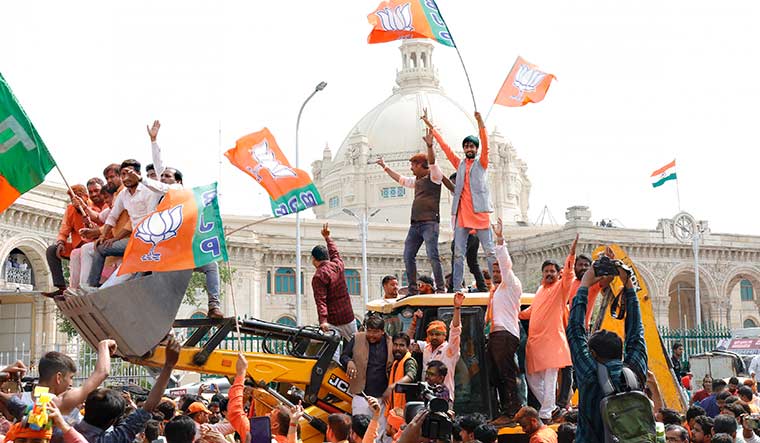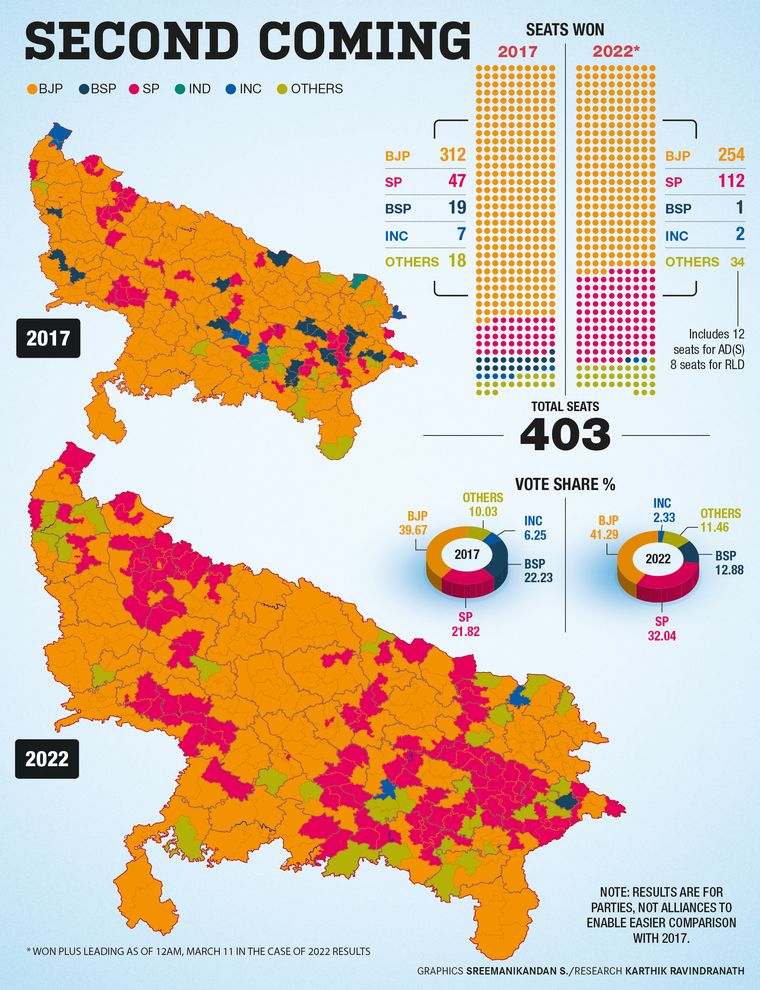Some five hours into the counting of votes, a bulldozer was stationed outside the BJP office in Lucknow. The ‘Bulldozer Baba’ jibe that Akhilesh Yadav had made against Yogi Adityanath was turned into a symbol of victory. BJP supporters whose faces were smeared with orange gulal (dry colour) danced to the chants of Jo Ram ko laye hain, hum unko layenge (We will bring in those who have brought Ram). Elsewhere, the song UP ke bachcha bachcha ki farmaish mein Yogi ji (Yogi the choice of all of UP’s children) played.
At the Samajwadi Party office, stray supporters milled around. Party president Yadav drove into the office in a car with black tinted windows. There were no waves to party workers. The gates were shut on the media.
Sudhir Panwar, an SP leader from Shamli in western Uttar Pradesh, said, “It is the liquidation of the Bahujan Samaj Party which has helped the BJP the most.” However, in the outgoing assembly, there are only two BSP members from western Uttar Pradesh, after defections and expulsions.
Panwar’s other explanation is more plausible. He said the SP alliance had failed to attract the non-Jatav vote which is of a sizeable number in the west. “The gap between the landed, socio-economically dominant castes (the Jats) and the dalits is too large to bridge. They are not comfortable being with the SP but are attracted to the BJP because of its direct benefit transfer schemes,” he said.
The SP gained more than 10 per cent in vote share compared with the last elections, but in terms of seats, it could not reach a majority. Its vote share showed a greater increase than what the BJP’s did, which makes it easy to presume that the vote share lost by the BSP and (also perhaps) the Congress came to the SP in some measure.
But after consecutive losses in Lok Sabha and assembly elections, Yadav now stands at an uncomfortable junction. The narrative that the only time he became chief minister was when his father Mulayam Singh Yadav propped him up in 2012 will get stronger, even though it was the junior Yadav’s hard work that got his party 224 seats then.
He is also burdened with the irony of being labelled a parivarwadi (dynast) when, in fact, the only other Yadav family member who contested this time was his once-estranged uncle Shivpal Yadav. Thus, the one spin that the SP made on Adityanath’s status as a yogi—that one without a family could not understand the pain of loved ones—did not stick.
On seats that the SP was not contesting with allies, Yadav was the party’s only face. His wife, Dimple, stepped out minimally. And in Sirathu where she did, her remark that the colour of rust was bhagwa (saffron), implying that the BJP government was decaying, led to Adityanath proclaiming that he was a proud bhagwadari.
For all the hard work that Yadav put in in the run up to the elections, his absence from the ground during the pandemic was noticed. At one juncture, he was in London for family commitments, yet tweeting furiously and, in turn, drawing a barrage of scorn from the BJP.
The other criticisms—that he does not listen to party seniors, is opaque in his manner of functioning, is surrounded by advisers with little ground experience and relies too heavily on retired bureaucrats—will now become louder. And he will have to learn to listen to those inputs.
The Congress rout was not unexpected. There is praise for party general secretary and state in-charge Priyanka Gandhi Vadra’s efforts, but an equal measure of criticism for her strategy lacking focus.
The party’s Ladki Hoon Lad Sakti Hoon campaign drew applause from her opponents. Juhie Singh, chairperson of the SP women’s wing, said, “It has opened a pandora’s box. Political parties will now have to address it and give more representation to women as a matter of right, regardless of the status of the Women’s Reservation Bill.”
On ground however, the Congress campaign was a non-starter. In Unnao, for instance, where the party fielded Asha Singh (mother of a rape survivor) the local unit boycotted the candidate, and the campaign was left to party workers from outside the state. One such worker said when attempts were made to draw Vadra’s attention to the fact, her closest aides at the party headquarters in New Delhi refused to convey the reality to her.
Also read
- Assembly elections: BJP, AAP ride on delivered promises and effective communication
- The divided caste vote in UP
- Rise of the beneficiary class
- 2022 Assembly elections: Is it sunset for the Gandhis?
- AAP's governance in Punjab will determine its national footprint
- AAP poised to replace Congress and out-compete BJP: Prof Pramod Kumar
However, in this loss, the Congress could perhaps emerge as the party which gains the most. These elections have shown that there is no credible opposition in the state, and thus in the Lok Sabha elections of 2024, the scattered anti-BJP vote could line up behind the Congress.
Usman Engineer, a Rashtriya Lok Dal leader from Muzaffarnagar, said, “Vadra is in our hearts now, regardless of the number of seats her party gets.”
To the BJP’s credit, it took every misstep and jibe, and implanted it in its election arsenal. Thus, Adityanath’s quite obvious communal call of an 80 per cent versus 20 per cent election was spun to mean that the ratio was that of those who wanted progress against those who wanted disruption. Midway through the polls, the narrative started to tilt more to the benefits of social welfare schemes that had gone to the most disadvantaged sections without discrimination based on religion or caste. Towards the end, India’s efforts to evacuate students from Ukraine were also woven into election spiel to mix nationalistic pride into politics.
The election results most acutely mean that Adityanath’s position is consolidated and strengthened. Whatever speculation of inner-party conflicts had been made (including the sending of Arvind Kumar Sharma from Gujarat to be the eyes and ears of Prime Minister Narendra Modi) will now be shut down. He had stood his ground and refused to be dictated to by seniors. It was a telling comment that when the results started pouring in, his cut-outs being waved around at the party office were bigger than that of Modi.
For now, it seems ‘Bulldozer Baba’ has not just razed the opposition, but has also silenced every voice of dissent within the party.



